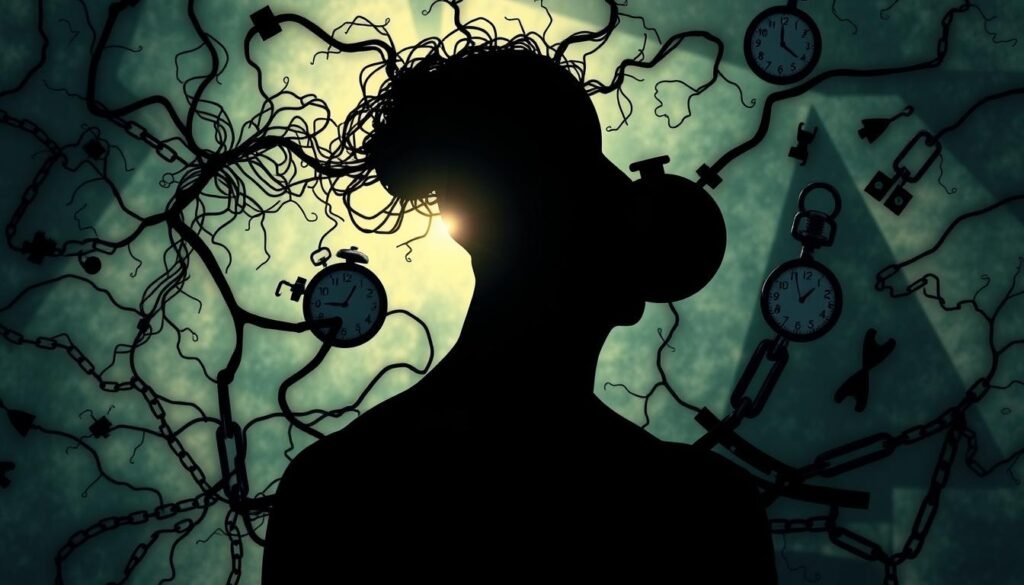Did you know about 25% of adults often feel tired? Much of this tiredness is due to mental health problems. This fact highlights the deep connection between mental health and total well-being. People dealing with stress, depression, or anxiety can get stuck in a hard cycle. This is where emotional pain makes fatigue worse.
Low motivation and focus can make things tougher. So can genetic factors and unfair views from doctors. It’s key to understand how mental health impacts things like tiredness. To feel better, trying physical activities, eating well, and getting advice can help a lot. To learn more, it’s important to check out detailed sources. A good place to start is the Mental Health Foundation.
Key Takeaways
- Fatigue often links to psychiatric disorders, affecting overall well-being.
- Issues like stress, anxiety, and depression play a big role in feeling tired.
- Managing mental health well can lessen tiredness.
- Knowing how mental and physical health are linked is vital.
- Living a balanced life with exercise can improve mental health and energy.
Understanding Fatigue: A Comprehensive Overview
Fatigue is about feeling deeply tired, both in body and mind. It comes in different forms and really changes how we handle daily tasks. There are two main types: normal fatigue, which rest helps, and chronic fatigue syndrome, which requires medical help.
Fatigue is very common in those with Major Depressive Disorder (MDD). Some research shows that even when MDD gets better, one-third of patients still feel very tired. This ties long-term tiredness closely to mental health. Over 90% of those with MDD deal with severe fatigue, even on antidepressants.
Measuring and treating fatigue is hard because it feels different for everyone. Too much work, getting sick, certain meds, and how we live can all lead to feeling wiped out. This kind of tiredness makes getting through the day tough, hurting our work, school, and time with friends.
Table summarizing key distinctions in fatigue types:
| Type of Fatigue | Duration | Possible Causes | Response to Rest |
|---|---|---|---|
| Normal Fatigue | Short-term | Physical activity, emotional stress | Alleviates with rest |
| Chronic Fatigue Syndrome | Long-term (6 months+) | Often idiopathic, possible association with viral infections | Not alleviated by rest |
| Physiologic Fatigue | Varies | Activity imbalance | Relief with rest |
For fighting fatigue, especially chronic kinds, exercise therapy is suggested. Adults can also find a lot of help from cognitive-behavioral therapy. Fatigue often points to other health problems and mental health issues. So, it’s crucial to get a complete check-up to find and treat the main cause.
Fatigue and Psychiatric Disorders
Fatigue and psychiatric disorders are deeply connected, helping us understand both better. Often, chronic fatigue syndrome (CFS) is confused with psychiatric symptoms. This section looks into how chronic fatigue syndrome and psychiatric disorders differ and their comorbidity rates.
Chronic Fatigue Syndrome vs. Psychiatric Disorders
Chronic fatigue syndrome is marked by extreme tiredness that doesn’t improve with rest. People with CFS want to stay active but feel too tired. Common symptoms are joint pain, sore throat, and muscle weakness. On the other hand, depression includes sadness, anxiety, and loss of interest in once-loved activities.
This difference is crucial for doctors to recognize; each condition has its own set of symptoms and diagnosis criteria. They can exist together, but are distinct.
There’s a strong link between chronic fatigue syndrome and psychiatric issues, such as anxiety and depression. Hormonal imbalances and poor sleep might contribute to this connection. A study looking into anxiety and fatigue in older adults offers more information, available here.
Comorbidity Rates of Fatigue and Mental Disorders
Many people with chronic fatigue syndrome also suffer from mental health problems. Research shows that about two-thirds of those with chronic fatigue have psychiatric conditions too. This is important for coming up with effective treatment plans.
There’s a table below showing common symptoms and treatments for both chronic fatigue syndrome and psychiatric disorders. It highlights how these conditions overlap and influence each other:
| Condition | Common Symptoms | Treatment Options |
|---|---|---|
| Chronic Fatigue Syndrome | Persistent fatigue, joint pain, sore throat, muscle pain | Therapy, deep-breathing exercises, yoga |
| Depression | Sadness, anxiety, disinterest, sleep disturbances | Counseling, antidepressants, mood stabilizers |
Understanding these comorbid conditions helps healthcare providers create better treatment plans. It’s important to treat both chronic fatigue syndrome and psychiatric disorders together to improve patient health.
The Role of Mental Health in Overall Well-being
Mental health is key to our well-being. It affects our feelings, how much we get done, and our physical health. When our mental health isn’t good, we may feel really tired. This can make it hard to do well at work or home.
Lots of people around the world are dealing with depression. Over 168 million people are affected by it. It’s a major reason why some people find it hard to live life fully.
Being sick with long-term illnesses can make people feel very tired. Studies show that nearly all cancer patients feel exhausted. Many with multiple sclerosis say tiredness is a big problem for them. This shows that mental health issues can make everything else in life harder.
Stress also plays a big part in how we feel mentally and physically. It’s linked to many mental health problems. Stress can make us feel more tired and worn out. To feel better, it’s important to deal with stress, get help when needed, and take care of ourselves.
Taking care of our mental health can make life better. It helps cut down on feeling tired all the time. When we manage our mental health, we can enjoy life more and do our daily activities better.
Stress, Depression, and Anxiety Contributing to Fatigue
It’s key to see how stress, depression, anxiety, and fatigue are linked. Stress for long periods can increase cortisol. This affects our mind and body deeply. Anxiety and depression both add a lot to feeling mentally tired. They cause emotional and thinking problems.
How Stress Affects the Body and Mind
Stress triggers many reactions in the body. More cortisol can mess up our physical health and lead to feeling worn out. Big life changes, like getting divorced or having money troubles, can make depression worse. Studies show women often feel more tired from stress than men do.
The Psychological Impact of Anxiety and Depression
Anxiety and depression tie strongly to mental exhaustion. Those who can’t sleep well are much more likely to feel anxious. Long-lasting worry and stress might lead to chronic fatigue syndrome. This means feeling tired no matter how much you rest. To fight stress, adults should sleep 7 to 9 hours each night. Adding 30 minutes of exercise five days a week helps a lot, too.

| Factor | Impact on Mental Health |
|---|---|
| Chronic Stress | Elevates cortisol, leading to fatigue and increased risk of depression |
| Anxiety | Disrupts sleep patterns, contributing to mental fatigue |
| Depression | Can cause persistent feelings of tiredness and hopelessness |
| Physical Activity | Helps alleviate stress, anxiety, and depressive symptoms |
| Cognitive Behavioral Therapy (CBT) | Offers strategies to manage stress and alter negative thought patterns |
Symptoms of Mental Exhaustion
Mental exhaustion shows up in many ways, affecting daily life and relationships. Spotting these signs early helps manage and reduce mental tiredness. Each symptoms of mental exhaustion help us know how to help better.
Common Signs to Recognize in Daily Life
When mentally exhausted, people might see changes that make daily tasks hard. They may feel:
- Feeling less alert than usual
- Increased irritability and emotional detachment
- Struggles with concentration and focus
- Symptoms of anxiety or heightened feelings of depression
Physical and Behavioral Indicators
Physical signs can also point to mental exhaustion. Common ones include:
- Headaches and muscle soreness
- Upset stomach and changes in appetite
- Sleep issues, leading to frequent fatigue
- Increased vulnerability to illnesses
On the behavior side, mental exhaustion may change how people handle tasks. This might mean:
- Avoiding social interactions and responsibilities
- Declining performance in professional or academic settings
- Increased use of substances, as individuals may seek relief
- Feelings of overwhelm in relation to day-to-day tasks
By knowing these signs, people can work towards recovery. It’s key to address the causes to improve health and wellness.
Impact of Sleep Disorders on Mental Health
Sleep disorders can seriously harm someone’s mental health. They can make anxiety and depression worse. Not just making people tired, these issues harm how we feel and think. Many people started having trouble sleeping because of COVID-19.
About one in three people showed signs of insomnia in a study. Nearly 20% had serious insomnia. That’s a lot more than before the pandemic. Also, about 56% of people in the US said they slept poorly during the pandemic. This number jumped to 70% among folks aged 35-44. Poor sleep and stress go hand in hand.
We need to find ways to help people sleep better. The American Academy of Sleep Medicine says adults need at least 7 hours of sleep. But over 50 million Americans can’t get enough rest. Fixing sleep problems is key to feeling emotionally better.
Many people with insomnia also have another mental health issue, like anxiety. Insomnia and mental health are closely linked. Cognitive Behavioral Therapy for Insomnia (CBT-I) is a top treatment option. It’s helping people cope with the effects of sleep troubles on mental health.
| Population Group | Recommended Sleep Duration | Reported Sleep Quality |
|---|---|---|
| Adults | 7-9 hours | 34% report “poor” or “only fair” quality |
| Teens | 8-10 hours | Only 30% get at least 8 hours per school night |
| Older Adults (65+) | 7-8 hours | 42% report insomnia symptoms |
The Connection between Burnout and Mental Fatigue
Burnout is more than just physical tiredness. It brings deep mental weariness. It’s when stress causes emotional, physical, and mental drain for too long. This can lead to bad health outcomes. People might feel disconnected, less effective, and less proud of their achievements.
Defining Burnout: Beyond Physical Exhaustion
Burnout and mental fatigue are closely linked. Studies show a strong connection between burnout and depression. The link has a correlation coefficient of r = 0.520. This means a lot of people with burnout also feel hopeless and depressed. Anxiety is important too, with a correlation of r = 0.460. These mental issues make burnout more dangerous. It highlights why it’s crucial to catch and treat it early.
Long-term Consequences of Burnout on Health
Burnout has serious long-term effects on health. It can lead to chronic fatigue syndrome. People with serious job burnout might get heart disease, high blood pressure, or type 2 diabetes. Heavy workloads, little control over work, and few friends at work can cause burnout. Not fixing these issues puts people at risk of bad mental and physical health.
Burnout doesn’t just hurt the person—it hurts their work and society too. Companies see more people missing work, more staff leaving, and a drop in morale. It’s key to tackle burnout causes like too much work and unclear job roles. This helps create a happier and healthier work environment.
Mood Disorders and Their Link to Fatigue
Mood disorders, like depression and bipolar disorder, connect deeply with fatigue. They affect the daily lives of many. About 7% of adults in the US face depression, and about 2.8% deal with bipolar disorder. These conditions can cause tiredness that doesn’t go away, even with rest. It’s key to understand this connection to boost mental health and treatment success.
Women get mood disorders more often than men. Major depression hits women nearly twice as much as men. The rate of people getting major depression is between 5% to 17%. Knowing who is most affected is important. Major depression usually lasts more than two weeks, showing how serious and life-disrupting it can be.
Bipolar disorder brings its own set of problems. It leads to high moods lasting up to a week for Bipolar I. For Bipolar II, these periods are shorter. Another type, Cyclothymia, involves shifting between emotional highs and lows. This greatly affects a person’s ability to function and adds to their fatigue. Mood disorders also significantly impact kids and teens, with about 15% diagnosed with a mood disorder.
| Mood Disorder | Prevalence Rate | Typical Duration | Impact on Fatigue |
|---|---|---|---|
| Major Depression | 5% – 17% | At least 2 weeks | Significant |
| Bipolar Disorder | 2.8% | Variable (1 week for mania, | High |
| Cyclothymia | Not specified | Variable | Moderate |
| Children & Adolescents Mood Disorders | 15% | Variable | High |
Studies show that treating mood disorders can help reduce fatigue. This underlines the need for healthcare that combines various approaches. By understanding how mood disorders and fatigue are linked, we can find better treatments and coping methods.

Managing Mental Health: Strategies to Combat Fatigue
Managing mental health is key to fighting fatigue. Life’s daily stressors can overwhelm us, hurting our well-being. But, by adopting specific strategies, we can boost our energy and mental strength.
Effective Relaxation Techniques
Relaxation methods are vital in fighting fatigue and stress. Practices like mindfulness, guided imagery, and meditation help focus our minds and bring calmness. Physical activity releases endorphins, boosting happiness and relaxation. You don’t need a gym membership; walking or stretching can also elevate your mood. The Mayo Clinic discusses exercise’s benefits for mental health.
The Role of Lifestyle Modifications
Lifestyle changes are crucial for better mental health and less fatigue. Good sleep, balanced diet, and a healthy work-life balance make a big difference. Cutting back on caffeine and alcohol helps with better sleep. Engaging in restorative activities boosts energy. It’s wise to talk to healthcare experts before making major lifestyle changes. This includes using natural solutions for adrenal fatigue, as Bright N Boost suggests.
Identifying Premorbid Risk Factors for Fatigue
Knowing the premorbid risk factors for chronic fatigue is key for prevention and managing mental health. Many factors like society, psychology, and biology can increase the risk of chronic fatigue. Spotting these risk factors early can help in taking action quickly and making better lifestyle choices.
Common Risk Factors Associated with Chronic Fatigue
There are several risk factors that can lead to chronic fatigue. Here are some important ones to know:
- Emotional Instability: People with unstable emotions might be more likely to get chronic fatigue, since stress can cause mental tiredness.
- Sedentary Lifestyle: Not being active enough can be linked to fatigue. Regular physical activity is good for both body and mind.
- Continual Exposure to Stress: Long-term stress affects mental health and can lower energy levels, increasing fatigue risk.
- Major Depressive Disorder: This condition affects many people, with up to 16.6% of folks experiencing it in their lifetime. It’s often connected to fatigue due to feelings of hopelessness and low energy.
- Anxiety Disorders: Anxiety, often seen with depression, leads to fatigue. It brings ongoing worry and panic, draining both mental and physical strength.

Knowing these risk factors can lead to early steps in healthcare. This helps in better mental health and might reduce symptoms of chronic fatigue. Understanding how these factors work together offers insight into early diagnosis and effective treatment.
Conclusions on Mental Health and Fatigue
The world faces the ongoing effects of the COVID-19 pandemic. The connection between mental health and fatigue is clearer now. The increase in anxiety and depression by 25% in the first year of the pandemic shows we need to combine ways to promote well-being. It’s crucial to deal with emotional distress. High anxiety and depression levels often lead to severe fatigue. This can affect daily life and happiness.
Healthcare workers have faced big challenges during this period. Burnout rates have soared. In France, over half of healthcare providers report burnout. A study from Yangzhou city shows a link between fatigue and mental health problems in frontline medical staff. Improving support for mental health is key. Developing effective strategies is necessary, not just short-term solutions. This includes strong mental health services, even when normal services are disrupted by a crisis.
We need to focus on holistic mental health strategies in the future. These strategies should address both emotional distress and fatigue together. Both individuals and organizations will gain from support systems that meet mental health needs while building resilience. Mental health funding is still too low. Governments, healthcare workers, and communities must work together. To learn more about these important issues, check the study on healthcare workers here.